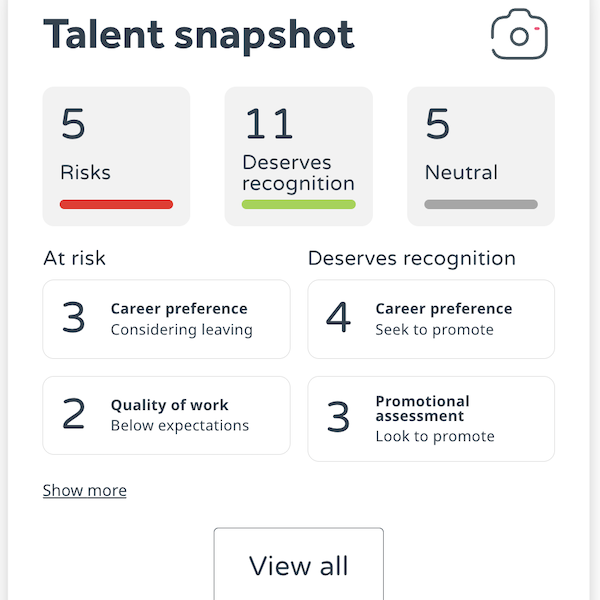The way we work has been shaken up for good and personal and professional development is on the rise. Covid-19 has forced people to develop new skills, or risk being left behind. Covering the workload of furloughed team members and jumping into new roles has required a skill-set that many people never expected just one year ago.
But while this started as a necessary response to the pandemic, for many, the requirement for new skills has transformed into an opportunity to develop yourself professionally. More employees have been setting professional and personal growth goals throughout the pandemic with 78% of people stating that they expanded their existing skills or knowledge during the pandemic, according to a 2020 report.
This guide will explain what personal and professional development is, why it’s important and will show you how you can develop yourself professionally and create a culture of people development in your workforce.
Quick links
What is personal and professional development?
Why is personal and professional development important?
How are personal and professional development linked?
Cultivating a culture of people development
Personal and professional development self assessment
What is personal and professional development?
Personal development is part of an innate human need to grow and reach our full potential. It is an ongoing process that starts as young children in our formative years and continues long into old age. It allows people to set goals, assess and learn new skills and develop our individual qualities that make us who we are.
Personal development helps lead people to a more fulfilled, happier and higher quality lives. Maslow defines this as “self-actualisation,” and the epitome of what one strives for in life. In order to reach this phase of personal development we must satisfy inherent needs such as safety and security, love and belonging, and esteem needs.
When these needs are met, we become more motivated, engaged and happy which provides the capacity to strive for personal development and growth.
By comparison, professional development takes place in a particular phase of our lives. This is a specific, career-oriented need that benefits employees greatly. Ongoing professional development opportunities are a significant motivator and can provide employees with a greater sense of purpose and belonging within an organisation.
The purpose of professional development is to continuously learn and acquire new knowledge and skills to support our career goals and can be supported with WeThrive’s 4C Employee Experience Model, which has been developed by workplace psychologists based on Maslow’s human needs model.
Want to learn more? Book a demo to learn how WeThrive can transform your employee engagement strategy today.
How do we know if we have an engaged workforce?
Do employees get clear, frequent opportunities for growth in your organisation? For some longer-term employees there is a logical path of progression through your organisation. But people development is rarely invested in to its maximum potential.
74% of employees don’t believe they are reaching their full potential
Nearly three quarters of employees surveyed felt that they actually had more to offer their workplace, and that development opportunities would help them feel valued and more competent in their role.
Most employees want to succeed at their jobs. In fact, 40% of those who don’t receive the necessary training to become effective in their roles will leave their positions within the first year.
Therefore, this is a highly valuable opportunity for your business. Developing your employees’ skill set will improve overall performance and productivity levels resulting in more satisfied teams and customers.
Businesses who invest in professional development reduce turnover
Top performers who know you value them and want to invest in their future are less likely to leave your business. 70% of employees indicated that professional development opportunities influenced their decision to stay at their job in a 2016 Gallup Survey. Furthermore, 87% of Millennials cited access to personal and professional development or career growth opportunities as being very important to their decision of whether to remain at a company.
Becoming an employer of choice with high staff retention rates is simply good for business. It keeps morale high, improves your organisation’s reputation and reduces the eye-watering cost of turnover. At an average of £12,000 to replace an employee, the benefits of investing in professional development speak for themselves.
Companies that invest in training and development can experience 24% higher profit margins
More dedicated, satisfied employees = high productivity and lower turnover. Providing your employees with development opportunities should be viewed as an investment rather than a “nice to have”.
Employees who are always learning new things and developing in their role are 10 times more likely to be inspired than those who are not. We all know that uninspired employees are less likely to be committed to doing a good job and ensuring that your organisation succeeds.
“One quality of leaders and high achievers in every area seems to be a commitment to ongoing personal and professional development” – Brian Tracey
How are personal development and professional development linked?
Personal development is very much tied to your professional growth, and they can certainly be viewed as two sides of the same coin. If personal needs are not met, this can have a negative impact on your mental health and wellbeing, and in turn will stunt your professional growth.
Mental health and wellbeing has suffered greatly throughout 2020, with people reporting a sharp decline in their ability to cope with pandemic-related stress. In times of high-stress it can feel instinctual to hide away. But learning new skills, from baking banana bread to improving digital skills, is a proven way for people to take back control and autonomy over their wellbeing. Accomplishing small goals can be a powerful motivator and help to get struggling employees back on track to personal and professional development.
Furthermore, a commitment to personal growth indicates how willing and able you are to develop professionally. For hiring managers, promotional opportunities can become clear when employees demonstrate dedication to learning and growing.
For example, if your employee regularly uses their WeThrive Bubble to run self-assessment surveys to discover where they have opportunities for growth then they’re likely to be a future leader for your organisation.
Employee engagement case study
FSCS, led by Chief People Director David Blackburn, is changing the perception of what it means to be a people-first organisation. Year on year engagement, wellbeing, happiness and productivity have improved. Now, FSCS are looking to the future, and are focusing their people strategy towards personal and professional development and helping employees reach their career goals. Read how individuals at FSCS are owning their employee experience.
Cultivating a culture of people development
Invest in training and development opportunities for everyone
Everyone in your organisation should have access to personal and professional development opportunities, no matter their role. Cultivating your internal talent will make your workforce resilient, flexible and capable of taking on new challenges.
Allocate a team budget and an individual employee budget so your people can develop their interpersonal skills and take ownership of their personal and professional growth.
Training doesn’t have to be a traditional manager away day, or a leadership course presented from a handbook. Remote working has introduced us to a new world of extensive learning and development opportunities, with libraries of content available online. Encourage your people to find webinars that interest them, 1:1 coaching sessions, a skill-sharing day with another team or interactive eLearning classes that will help them reach their goals.
Identify your skills gaps
Put your employees in the driving seat. What direction do they think their development needs to go? Rather than presenting your people with a limited set of courses in one format you need to find a fit that works for them. Employees who are told to attend a specific professional development training course will be less likely to engage with the content than if they choose it themselves.
Discuss what success would look like for each employee in your one-on-one meetings, and how filling this skills gap would improve long-term performance and motivation in their role. You can provide a guideline for your general expectations, but let your employee own their development. They have a much better understanding of their needs and can identify a training format that works for them.
If your employees aren’t sure where they need to focus their attention, they can run a WeThrive self-assessment survey to discover which areas need support.
Some common examples of professional development opportunities are:
- Working alongside or shadowing more experienced employees
- Taking on more challenging tasks
- Doing a skill-share session with another department
- Gaining a mentor or buddy
- External conferences or online training courses
- Webinars and eLearning
- Training at career-relevant associations or institutes
- Studying for higher level management or other qualifications
- Team coaching sessions
Create a follow-up plan
One day you’re feeling motivated after discovering a new way of doing something or putting a new tool in your back pocket. The next, you’re falling back into old habits. It can be easy to slip back into the normal way of doing things at work, especially if you’re not actively committed to your professional development.
Don’t let progress falter. If Lisa in sales attends a webinar about negotiation then her line manager should book time afterwards to discuss what she learnt and how she plans to use this in her development. If your people can identify the situations where they can apply this knowledge, you’ll see quick, long-lasting personal and professional development.
Make development an ongoing process
How often do your employees receive training or development opportunities? If it’s infrequently they’re likely to become bored, complacent and disengage from their role. If it’s too frequently they could get overwhelmed.
Managers should be regularly discussing what opportunities are available with employees and listening to the personal or professional development they might be interested in. Monthly one-on-ones are a good opportunity to get insight directly from individuals in your team. But getting the balance right is key. You may have a few employees who aren’t in the right frame of mind for extra development opportunities, perhaps due to external pressures such as home-schooling. If they are still happy, motivated and performing at work then revisit in a few months.
Want to learn more? Book a demo to learn how WeThrive can transform your employee engagement strategy today.
Personal and professional development self assessment

Our latest feature, the WeThrive Bubble empowers your people to own their individual employee experience. Rather than waiting for annual performance reviews, quarterly engagement surveys, or even 1:1s with managers, your employees can take control.
With their personal bubble your people can run a quick self-assessment survey to identify where they need support. From finding meaning in their role, to personal performance, or team cooperation, WeThrive can take the guesswork out of what to do next. With built-in action recommendations designed by expert workplace psychologists your people can identify personal and professional development opportunities immediately. WeThrive even provides your people with the tools and resources they need to grow.
Want to learn more? Book a demo to learn how WeThrive can transform your employee engagement strategy today.




